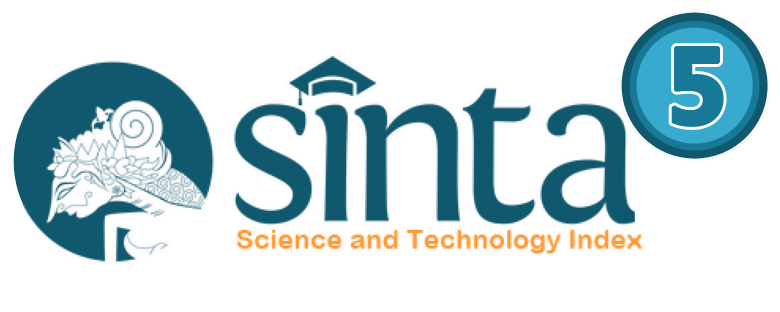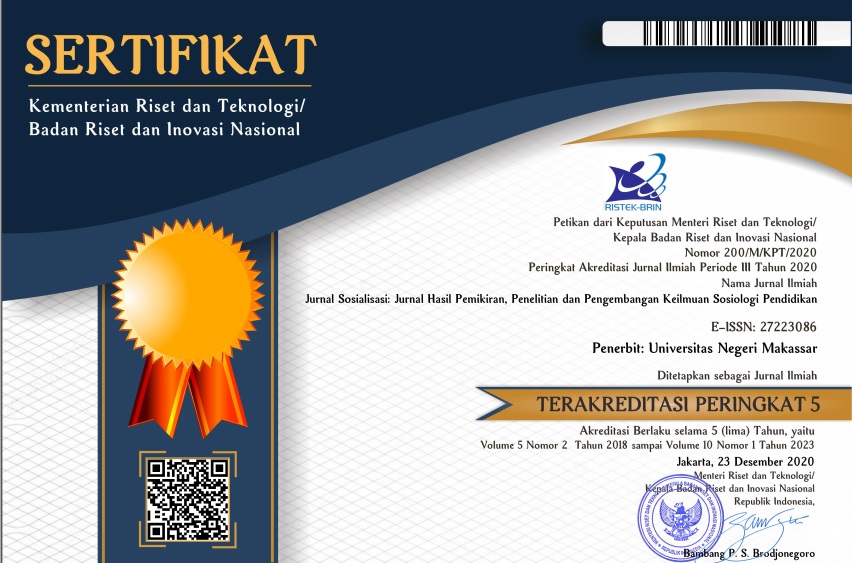Culture and Freedom of Religion: Interrogating Animal Rights
(1) Nnamdi Azikiwe University
(*) Corresponding Author
DOI: https://doi.org/10.26858/sosialisasi.v1i1.22646
Abstract
When religious freedom and animal interests do clash many people believes that humans have a strong interest being free to practise their religion. Hence, this work interrogates the problem of animals rights within culture and freedom of religious expression. This work evaluated whether the human interest in freedom of religion trumps animals’ interests in avoiding pain and in being killed. This acknowledges that only some few religions actually require their followers to harm animals. Thus, the animal rights advocacy of this work only has the potential to impinge upon religious freedom on a very rare number of occasions. However, for those religious pratices that encourages harming of animals, this work argues that the interest in religion cannot be regarded as ‘special’, meriting priority over any other competing interest. Nor can the goal of equalising individuals’ opportunity to pursue their conception of the good take priority over all other claims. Just as we would not let humans suffer intolerably in the name of religion or equal opportunity, nor should we let animals. And just as we would not let human infants be killed in the name of religion or equal opportunity, nor should we let animals.
Keywords
Full Text:
PDFReferences
Casal, P. (2020). Whaling, Bullfighting, and the Conditional Value of Tradition. Res Publica, 1-24.
Cochrane, A. (2012). Animal rights without liberation: Applied ethics and human obligations. Columbia University Press.
Coté, C. (2014). Food Sovereignty, Food Hegemony, and the Revitalization of Indigenous Whaling Practices. The World of Indigenous North America, 239-62
Curchin, K. (2018). Testing the limits of the politics of recognition: Fox hunters in the United Kingdom. International Political Science Review, 39(4), 503-514.
Donaldson, S., & Kymlicka, W. (2011). Zoopolis: A political theory of animal rights. Oxford University Press.
Dursun, S., & Mankolli, H. (2021). The Value of Nature: Virtue Ethics Perspective. GNOSI: An Interdisciplinary Journal of Human Theory and Praxis, 4(1 (May)), 1-15.
Eisgruber, C. L., & Sager, L. G. (1994). The Vulnerability of Conscience: The Constitutional Basis for Protecting Religious Conduct. The University of Chicago Law Review, 61(4), 1245-1315.
Fischer, J. (2016). Markets, religion, regulation: Kosher, halal and Hindu vegetarianism in global perspective. Geoforum, 69, 67-70.
Fisher, J. (2011). The four domains model: Connecting spirituality, health and well-being. Religions, 2(1), 17-28.
Mbum, P. A., Oben, B., & Ighoteguonor, E. G. (2014). Empirical study on global marketing flows and Nigerian economic growth perspective. Journal of International Business and Economics, 2(4), 125-162.
Ogar, J. N., Asira, A. E., & Bassey, E. I. (2021). Land Ethic According to the Biblical Book of Genesis and Isaiah. GNOSI: An Interdisciplinary Journal of Human Theory and Praxis, 4(1 (May)), 16-30.
Osuala, A. N., & Nyok, E. I. E. (2018). New Twist to Political Corruption in 4th Republic Nigeria given Non-Human Animals Stealing millions: A Case for the Defense of Animal Rights. GNOSI: An Interdisciplinary Journal of Human Theory and Praxis, 1(2), 15-37.
Pannick, D. (1982). Judicial review of the death penalty. Duckworth.
Prato, G. B. (2005). The fox-hunting debate in the United Kingdom: a puritan legacy?. Human Ecology Review, 143-155.
Ravikanth, G. (2021). Indian Philosophy and Environmental Ethics. GNOSI: An Interdisciplinary Journal of Human Theory and Praxis, 4(1(May), 47-63.
Soares, N., & Stark, A. W. (2009). The accruals anomaly–can implementable portfolio strategies be developed that are profitable net of transactions costs in the UK?. Accounting and Business Research, 39(4), 321-345.
Soulsbury, C. D., Iossa, G., Baker, P. J., Cole, N. C., Funk, S. M., & Harris, S. (2007). The impact of sarcoptic mange Sarcoptes scabiei on the British fox Vulpes vulpes population. Mammal Review, 37(4), 278-296.
Swaine, L. (2005). The liberal conscience. Columbia University Press.
Tschakert, P., Ellis, N. R., Anderson, C., Kelly, A., & Obeng, J. (2019). One thousand ways to experience loss: A systematic analysis of climate-related intangible harm from around the world. Global Environmental Change, 55, 58-72.
Udoudom, M. (2021). The Value of Nature: Utilitarian Perspective. GNOSI: An Interdisciplinary Journal of Human Theory and Praxis, 4(1 (May)), 31-46.
Umukoro, G. M., Odey, V. E., & Ndifon, M. M. (2020). Immigration, Otherness, Economic mobility and social inclusion in the homeland. International Journal of Social Sciences and Education, 1(1).
Umukoro, G. M., Odey, V. E., & Yta, E. M. (2020). Tourism Site Infrastructure, Visitor Patronage and Calabar Metropolis. Jurnal Office, 6(2), 97-102.
van der Walt, B., & Swanepoel, R. (1995). Confessing Christ in Doing Politics: Essays on Christian Political Thought and Action (special issue of Orientation 75-78 (1995)). Potchefstroom: Institutc for Rcformational Studies.
Article Metrics
Abstract view : 651 times | PDF view : 34 timesRefbacks
- There are currently no refbacks.

This work is licensed under a Creative Commons Attribution 4.0 International License.


































